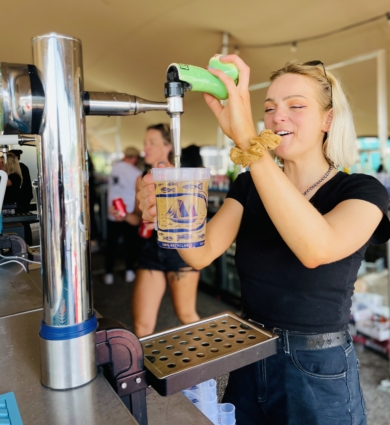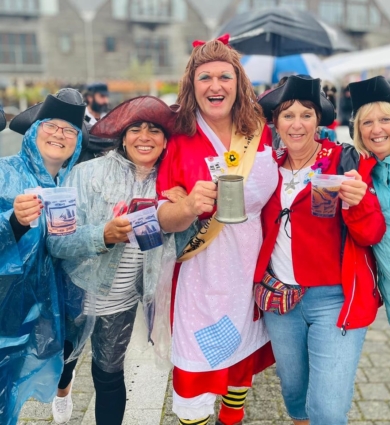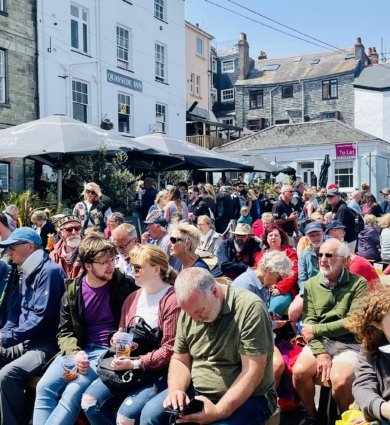Refill Guide for Events: Case Studies
Get inspiration from local councils and event producers who are finding the benefits from switching from single-use bar cups to reusables. For many this coincides with wider campaigns to ban single-use plastics, reduce their waste impacts and work towards net-zero.
SWANAGE COUNCIL APPLIES SINGLE-USE PLASTIC POLICY TO CARNIVAL
Swanage Carnival is an 8-day family event that takes place at the end of July and beginning of August, in Swanage, a seaside town in Dorset. It offers a huge variety of activities, including air displays, live music, sporting events, games, competitions, firework displays and not forgetting the highly anticipated Carnival procession.
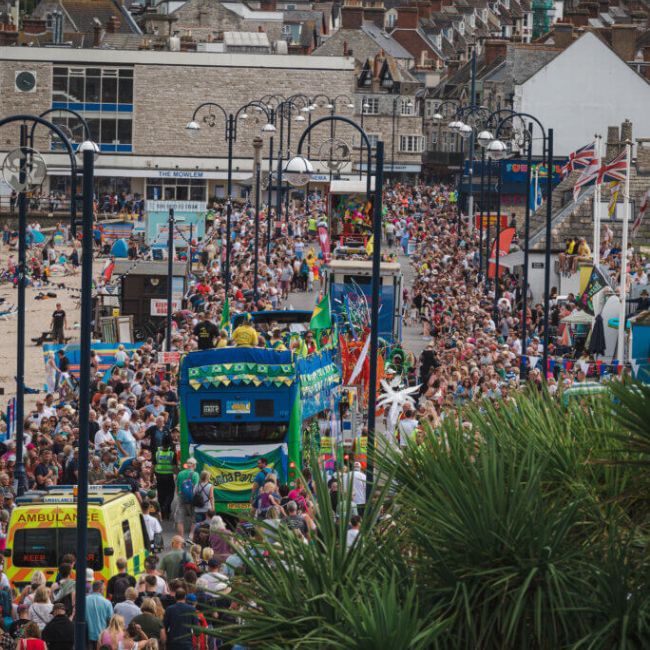
Image source: https://swanagecarnival.com/
Meeting their environmental policy commitments
The council requires the event to use reusable cups rather than single use recyclable or compostable options. This is because the council has put an environmental policy in place to reduce single use plastic in their coastal location.
Moving from buying to renting
The event, which is ran by Carnival volunteers, has been using reusable bar cups for a few years, usually buying branded ones and washing these on site. They have found lots have been taken home, which means they need to replace some and also that setting up and manning a washing station on site for 1000s of cups is a huge undertaking which is challenging on their field location. So this year they will be hiring cups instead.
For those who want a ‘souvenir’ they can swap the unbranded cups for some of the Carnival branded stock.
Unbranded cups delivered in
The event will be hiring in around 30,000 unbranded cups from StackCup, enough for each customer to have a fresh cup every time they go to the bar.
20,000 will be delivered at the beginning of the event. Half-way through the week there will be a collection of used cups and a supply of fresh ones delivered in. The cups will go back for washing and into stock to head to another event.
£1 deposit
Customers will be charged a £1 deposit when they buy their first drink and then will get a fresh cup with every new drink as long as they return their cup to the bar.
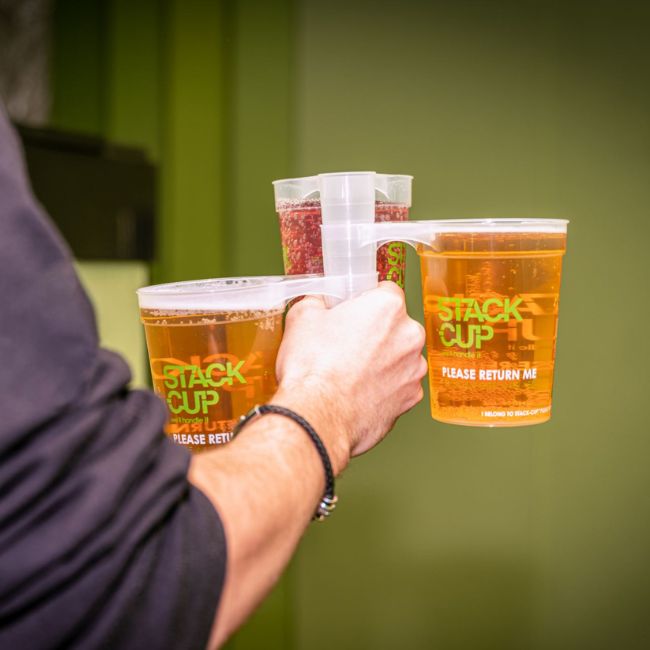
Carnival Chairperson Maria Foot said ‘the introduction of reusable cups to our event was a huge success, massively reducing the waste accumulated at our event. However, because we set up in a field location, it has always been challenging to set up an effective washing station on the field and to have enough volunteers to take part in the continuous washing and drying required, when we have over 100 events for our volunteers to run already. We are committed to reducing the use of single use plastic and using the hire option through StackCup makes it easy for us to meet this goal.’
MANCHESTER CITY PROVIDES CUPS FOR TRADERS AND CALCULATES CARBON CUTS

Council owned cups for hire
Manchester’s Christmas Markets have been using reusable cups for 14 years. The Council’s Specialist Markets team loan their branded cups to festive traders, selling hot and cold drinks, who charge customers a £2 deposit.
The traders then wash the used cups and reuse them until the end of the event and return to the markets team.
The Specialist Markets team also have a mobile washing trailer to manage washing capacity if required, where trader stalls do not have space for a wash facility.
Following research carried out in 2019, they have extended the availability of council owned cold drinks cups for summer events (when usually the cups would be in storage).
In 2022 they are trialling lending a stock of reusable cups for small to medium sized events to access. For the pilot, the cups are being loaned out free of charge, along with a bespoke advice service offered to organisers on how to implement the scheme.
Research findings
Manchester City Council conducted research with events in 2018 and 2019 and found that Manchester Food & Drink Festival achieved a a 40% saving in waste management costs from removing single-use cups, due to less bin emptying and litterpicking required.
Furthermore, calculating the savings for six events that had taken place between October 2018 and December 2019 and used reusable cups, they found that they saved 1.7 million single use plastic cups, reduced cup waste by an estimated 96% (~30 tonnes) and reduced CO2e emissions by an estimated 82% (~90 tonnes). And if they widened the scope for other city centre and local park events which involve food and drink, there were event greater savings to be had:
“If every adult were to consume an average of 1 drink (which is a conservative estimate), there is an opportunity to avoid the use of at least a further 1 million single use cups annually (in addition to the 1.7 million already identified). This equates to a further reduction of around 20 tonnes plastic waste per year and in the region of 57 tonnes CO2e emissions.”
Guidance for their event organisers
Furthermore, Manchester City Council has provided a suite of guides for event organisers of all sizes including a guide on reusable cups.
Updates
We will be sharing updates from Manchester’s trials here as they conclude them.
Festival notes the splendour of dance floors with reusable cups
Splendour Festival, organised by DHP Family, is a 30k capacity, family friendly music festival sited in the beautiful grounds of Wollaton Hall & Deer Park within the city of Nottingham.
Head of Concert Operations, Bob Bark stated that they adopted reusable cups because “we were very conscious of the waste generated from single use cups. There are now enough reusable cup providers in the industry to make the change an easy choice.”

Photo credit: Jake Haseldine
Unbranded generic gups on hire
Splendour festival hired in cups that were sent away for washing after the event. These were unbranded generic cups. Event attendees paid an initial levy charge of £1.50 for the first cup and got a fresh cup for every new drink, with nothing for subsequent cups, as long as the cup was returned. There was no deposit system to manage with the levy scheme.
50,000 cups reusable cups were used replacing 50,000 that would have gone in the bin previously.
Clean site and quick clean-ups
The festival team noted that “the site was remarkably clean at the end of the night. The area in front of the second stage was tidied of rubbish within 15 minutes of the last band finishing.”
With this knowledge, this means that in future years this the event can save money on litter pickers which can be redirected towards other sustainability areas.
Communication is key
The key area for improvements for the team is around communications, as Bob Bark highlights “Communication with the audience is key and the system only works with their engagement”.
Next year they plan to better communicate the reasoning behind the cups and the charges in advance of the event. “We still found that a surprising number of cups were thrown into general waste bins so we need either bigger carrots or more effective sticks next year.”
The organisation will also consider making a small number of branded cups available for those attendees who want a souvenir.
DHP Family also plan to move all their festivals and venues to reusable cups in the next couple of years.
SECRETSUNDAZE
The secret to clean dance floors and sustainable dance nights
Secretsundaze is a promotional company, record label and studio that puts on electronic club nights ranging from 300 to 2000 capacity
Why you adopted reusable cups?
Secretsundaze owners James and Giles started an initiative called Dance 2 Sustain, to address the environmental impacts of their events. As part of this they carbon offset their flights.
Originally, they bought recyclable paper cups and had lots of bins but they found the audience became confused and they spent a lot of time sorting the rubbish at the end of their night.
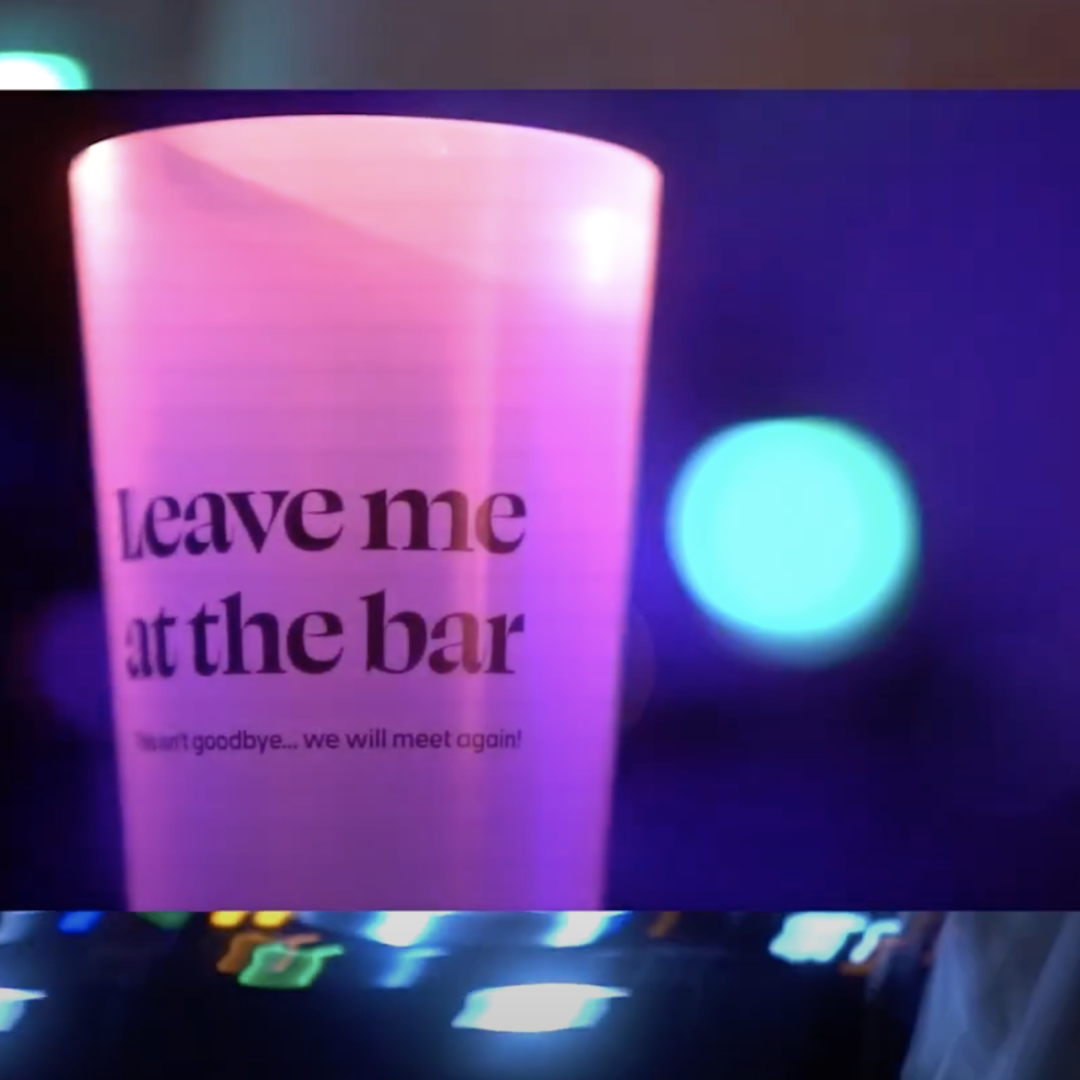
The best model for the party
Secretsundaze work with ecodisco who provide reusable plastic cups to the nightlife industry. Ecodisco drop off pint and half-pint cups before an event and collect afterwards for washing
“A £1 green fee is added to ticket prices to cover the cost of the service”
To date Secretsundaze have prevented more than 60,000 single-use cups from entering landfill
Hadi from ecodisco says “working with Secretsundaze has been an extremely exciting and impactful project. Their commitment to reducing their environmental impact as promoters is an inspiration to the underground music scene and long may it continue.”
Key learnings for indoor events
The service works smoothly in indoor spaces due to the physical boundaries preventing cup losses. The audience are supportive and help to return cups to the bars. The bar functions as normal with no need for deposits.
However, due to it being a fee added at the ticket price, there are lots of cups left on the floor, this can be prevented by cup collection bins that we have used at some events or by providing a discount on a drink if a cup is returned to the bar at point of purchase.
Communication is key. Ensure there is clear comms sent out pre-event and clear signage around the venue. If the service is being operated by the venue rather than a promoter, then increase drink prices by £0.20 and provide a £0.20 discount to everyone who returns a cup at point of purchase. This will cover the costs instead of the green fee in ticket price.
A deposit and levy scheme to aid returns
The Land Workers Alliance runs an annual Land Skills Fair, a 4-day festival for food, land and climate justice! It is a 1,200 capacity camping event which runs entirely on renewable energy and held on a farm and campsite in Gloucestershire.
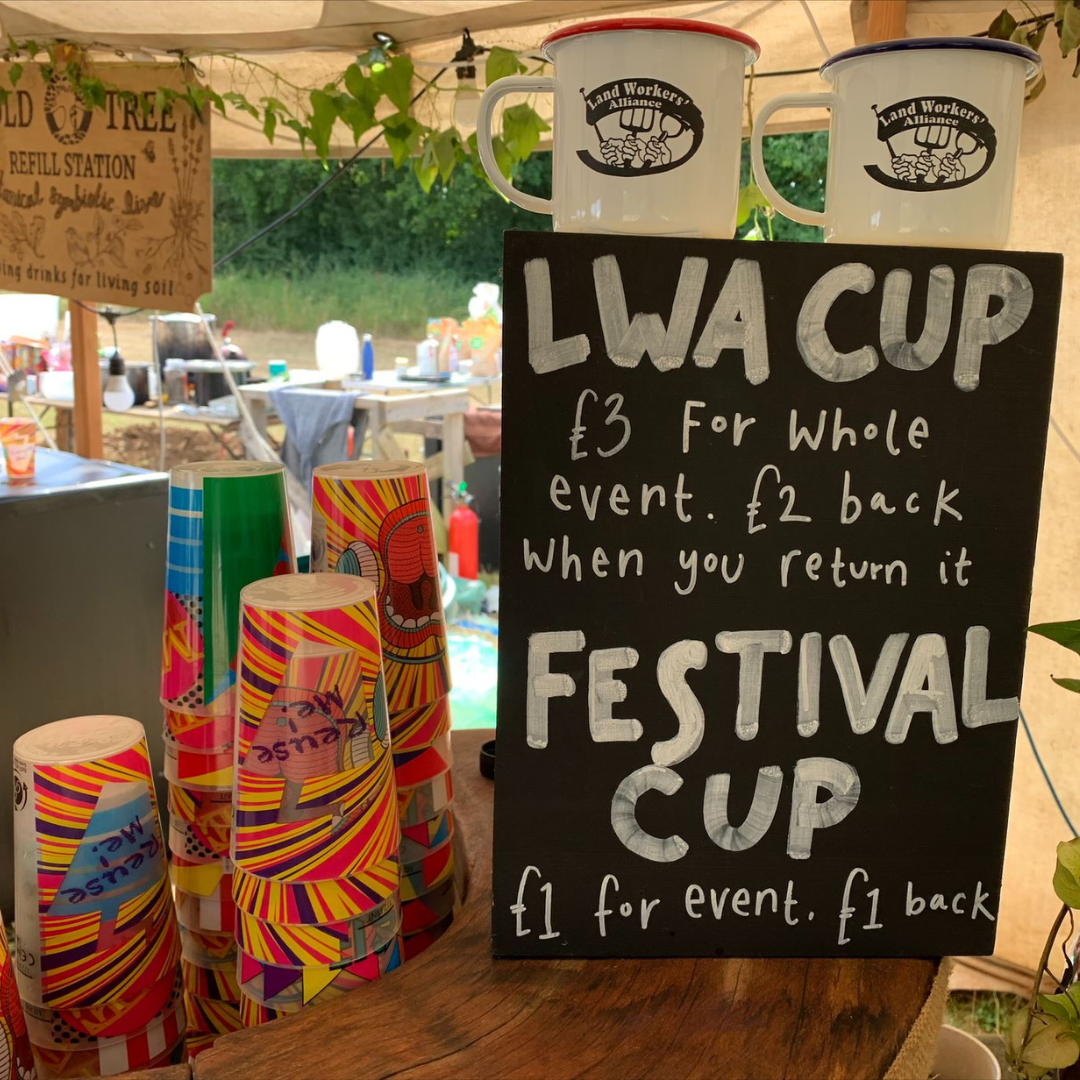
Photo credit: Jake Haseldine
Why did you adopt reusable cups?
The event organiser Brigite Rowan, after growing up in the festival world had seen the power of connection brought by festivals but on the flipside hated the wastefulness that the industry creates.
The model you choose:
The festival brought 1,000 branded pint cups and the bar company hired ½ pints.
The cups were washed and stored by an associate within the company for future use.
The event also had reusable plates which people had to wash after use- this led to long queues on site for washing stations, but there were no disposables on site.
A levy and deposit combination
Rather than choosing between a levy or a deposit (levies mean less cups are returned, deposits leave less money for cup hire and washing costs), people paid £3 for a cup and got £2 if they returned the cup.
Therefore, the organisation had money towards washing the cups as well as an incentive for people to return them.
“Despite a few extra logistical challenges, Implementing a no disposables policy on site was extremely rewarding: as well as creating less waste it also encourages people to think more carefully about the waste that they do create. We had a really great weekend and the Festival goers at LSF were so conscientious, there was barely any litter around throughout the weekend and the landowners were pleased to see a spotless rite at the end of the weekend!”
Singing Plastic-free Sea Shanties
The International Sea Shanty Festival, in Falmouth Cornwall had around 65,000 visitors over the 3 days in 2022.
Meeting their plastic-free commitments
As a plastic free town and one of the first towns to adopt an ocean recovery plan the organisers wanted to to cut down on waste and over-use of single use, disposable cups, especially as people were moving around the town and accessing many different venues.
The model chosen
The festival organisers bought in branded cups and distributed them between venues. Venues paid £1 for cups and then charged visitors £2 to buy them.
People held on to their cups when they got a new drink and so cups were not washed. People were expected to take them home as a sovenir.
The organisers said that “The cups were really well received by our venue teams and customers, It creates a positive news story for the town and ensures we are honouring our plastic free status”.
Any challenges
One sponsors logo did not lend itself well to the cups and it led to an unhappy customer. These cups also can’t be used for future years if the sponsors change.

